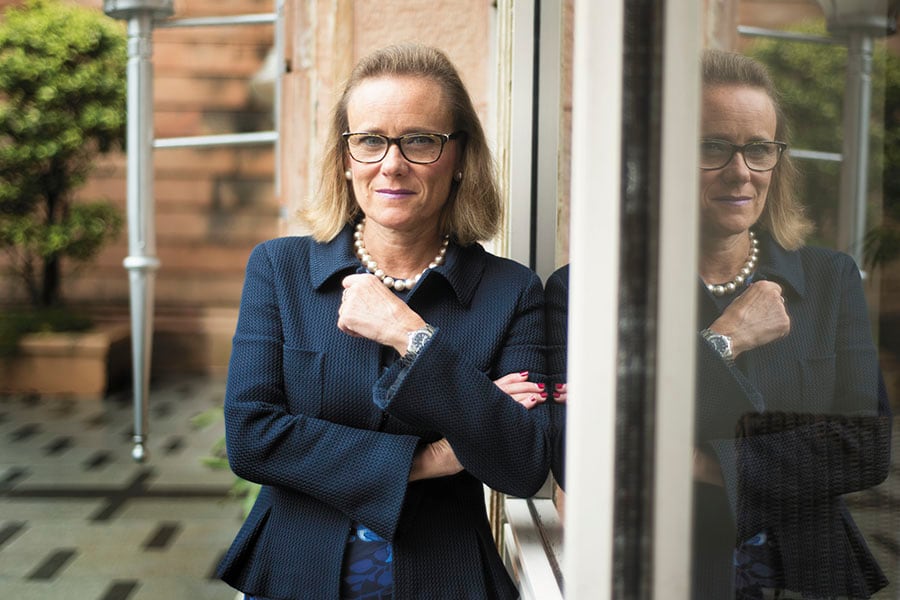
India is one of the growth drivers of our emerging markets strategy: Merck Healthcare CEO
Merck Healthcare CEO Belén Garijo says her company will accelerate its pace of growth in the country, but intellectual property protection and drug pricing are issues that need urgent attention

Merck Healthcare CEO Belén Garijo says it is important not to mix IP protection with the more political talk about cost
Image: Mexy Xavier
Merck KGaA, the world’s oldest pharmaceutical and chemicals group, expects to make rapid strides in the Indian market with its new biologic drugs, targeted at therapeutic areas including oncology and fertility, says Belén Garijo, member of the group’s executive board and CEO of Merck Healthcare. Garijo, 56, took charge of the Darmstadt, Germany-based group’s health care vertical in 2011. In an interview to Forbes India, she says Merck is the second-fastest-growing multinational pharma company in India and that it will not shy away from making further investments in the country to support its ambitious growth plans. Edited excerpts:
Q. Merck has undergone a process of transformation globally. What have been the implications of this on its India operations?
Pursuant to the transformation process that began in 2007, Merck has gained leadership in three verticals—pharma, which we now call health care after the merger of primary care (or biopharma, which comprises 90 percent of the health care segment’s revenues) and consumer health care into one division; life sciences (lab material, technology and services) and performance materials (chemicals, including pigments for auto paint and cosmetics and liquid crystals for display).
We have been in India for 50 years and operate across all three sectors; we have 4,000 employees and four manufacturing units here. Over the last couple of years, we have invested around 10 million euros (around Rs 75 crore at current rates) to develop our capabilities in India, and we expect to continue investing at that level over the next couple of years as well.
Health care accounts for half of our Rs 943 crore turnover from India and we will continue to make our product portfolio further consumer-oriented to better participate in the branded drugs opportunity that India presents. Already, we are growing above the market rate in many of the segments we are present in. In fertility, we are the leading player with a 33 percent market share of the recombinant FSH [follicle stimulating hormone] market. We are progressively gaining traction in oncology as well.
India continues to be one of the growth drivers of our emerging markets strategy, which has been very successful in the last five years.
Q. How much do emerging markets contribute to your global turnover and where does India rank?
When we say emerging markets, we don’t only refer to countries in Asia Pacific, but also other regions like Latin America and Russia. Emerging markets account for a little more than one-third of our sales, US accounts for 21 percent and Europe the rest. Of the 10 largest countries in the emerging markets where we are present, India ranks fifth.
Q. Do you see India’s relative position in the pecking order of emerging countries where you are present, improving?
My expectations and ambitions for India are high. India is doing really well. We have a new leadership team in India under Anand [Anand Nambiar, MD, Merck Ltd] and I am sure they will take the Indian business to new heights.
Q. How do you see the biopharmaceutical market shaping up globally and in India, from a demand and regulatory point of view?
I am very confident of our portfolio of biologics. During the last five years, our business has continued to grow despite increased competition and absence of new launches. We haven’t launched anything in the last five years, as we have been focusing on revamping our portfolio. We will now have a couple of launches in 2017 which will contribute to our global growth.
The regulatory environment is evolving fast on two major dimensions—intellectual property (IP) and affordability. The biosimilars [drugs similar to innovator biologic drugs] and generic drugs markets are already well-developed in India. We have competition for our biologic Gonal F [fertility drug] from biosimilars in India. Despite that, we have been able to maintain our leadership position in this category.
While the regulatory environment in the US is opening up to biosimilars, patent litigation is preventing the early entry of these drugs in the country. But we are also developing our own biosimilars since we have the capability after competing in the space of biologics for so many years; and there are synergies to be explored with our focus on oncology.
The biopharma market in India is growing slowly. It is worth around $13 billion [around Rs 90,000 crore] at present and is estimated to rise to $20 billion by 2020. But we will continue to participate in this market and launch new drugs as fast as the regulatory process allows us to.
Q. How do you see the landscape evolving with respect to IP and pricing issues in India?
These are the two major areas that the Organisation of Pharmaceutical Producers of India (OPPI) and global pharma associations are looking at.
As a responsible company, we are aware that we have to make drugs affordable. At the same time, we need to ensure that there is an environment in which innovation can be protected and fostered. We customise our product pricing approach to gain access to individual markets globally and take a very region-specific view when it comes to launching new drugs.
It is important not to mix IP protection with the more political talk about cost. Protecting innovation is of essence to bring innovation to patients. We also have a patient access programme under which we provide around 1,000 patients free access to medicines. The industry is not always recognised for the value we bring to the society.
(This story appears in the 30 November, -0001 issue of Forbes India. To visit our Archives, click here.)




